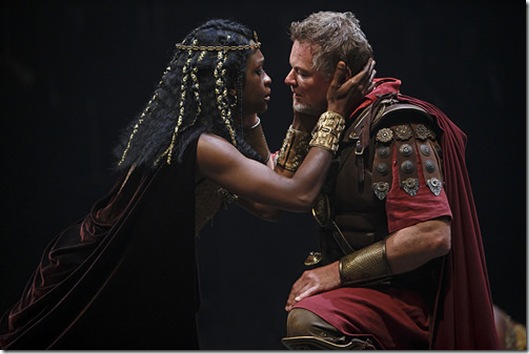Stratford’s Antony And Cleopatra: The Whole is Lesser Than The Parts.
Yanna McIntosh as Cleopatra, Geraint Wyn Davies as Antony. Photo David Hou.
STRATFORD — There’s no denying the memorable moments in the Stratford Festival’s new production of Antony And Cleopatra.
For example — the ferocious outburst of sexual rage from Yanna McIntosh’s Cleopatra when she learns that Antony, the love of her life, has married someone else. Director Gary Griffin shows a keen sense of dramatic timing here, extracting a mounting tension from the scene before Cleopatra explodes into fury.
That sequence is splendidly theatrical. But, in contrast, we also get displays of tender intimacy. A lovely scene where McIntosh helps the aging and weary Antony of Geraint Wyn Davies into his armour has an easy familiarity about it: these are two lovers who know each other well, who are comfortable with each other, who respond to each other naturally.
Shakespeare was not writing a conventional epic tragedy here, Furthermore, despite its strong erotic undercurrents, these are not young lovers driven to their doom by their passion. For all the play’s powerful moments, this is intimate tragedy —the tragedy of middle-aged love. When we get our first glimpse of Antony and Cleopatra, so careless and uninhibited in their affections despite the attendants surrounding them, the erotic component is palpable. It’s a public display, and they don’t care what the world may think of them.
We have an Antony so blinded by love that he can shrug off a growing political crisis: he’s betraying his obligations as a member of the triumvirate ruling the Roman Empire because of his ardor for Cleopatra, Queen of Egypt. But Wyn Davies also gives us the aging warrior, confronted with the kind of passions he thought he had left behind in his youth, and unable to maintain his intellectual and emotional equilibrium in the face of them.
Considering this play’s reputation for hothouse eroticism, it seems extraordinary that Shakespeare never allows his two lovers to be alone together on stage. But the subtext is there to be kindled — and yes, we’re certainly aware early on of the sexual chemistry between them.
So there is much to admire in this production. Why, then, does it seem so unfulfilling by the end?
The Tom Patterson Theatre is a promising venue for this play. Charlotte Dean’s economical but telling design offers pillars and scaffolding, also a striking oval platform, its stonework covered with hieroglyphics, which becomes the focal point for much of the action. Gary Griffin, a director comfortable with the demands of a thrust stage, exploits its dramatic potential well. During the play’s best moments, we are engaged.
But these are only moments. Griffin shows admirable skill here in creating a succession of memorable set-piece scenes. Unfortunately, they stand out individually, rather than as part of a larger dramatic fabric.
It can be a challenge to bring narrative clarity to Antony And Cleopatra, but previous Stratford productions show that it can be done. This year, there’s narrative confusion and little evidence of a unifying sensibility threading its way through the evening. The production is also bad on exposition: the political convulsions which ultimately destroy Antony are not clearly defined. Furthermore, in a play that takes place in both Egypt and Rome, the transitions between the two locales are so badly executed that we’re sometimes uncertain where we’re supposed to be. Ben Carlson’s Octavius Caesar and Randy Hughson’s Lepidus might just as easily be across the street from Cleopatra’s palace instead of a thousand miles away. Too often things collapse into a monotonous muddle. Is it so surprising, then, that we often become detached and disinterested observers?
Not every “big” scene works either. Whereas the death of Antony’s close colleague, Enobarbus, is staged simply but with stunning effectiveness, Antony’s final moments were triggering laughter on opening night.
Yet, there are performances of genuine substance beginning with the two principals. Yanna McIntosh shrewdly recognizes that Cleopatra herself was a bravura performer, and this translates into this fine actress’s own take on this maddening, mercurial woman who loves as intensely as she hates. McIntosh, her body language aflame, gives us a detailed portrait encompassing volatility, capriciousness, jealousy, boredom and restlessness. But even though she knows how to put on a show — there’s the sense that in sending for the asp, she’s orchestrating her own demise for dramatic effect — you can’t deny the eerie nobility of her passing.
Wyn Davies, in one of his best performances at Stratford, heeds Shakespeare’s text, making sure we’re getting “the triple pillar of the world transformed into a strumpet’s fool.” But although trapped in a production of frequent inadequacy, this veteran actor also conveys Antony’s emotional complexity — in particular, those jarring contrasts between euphoria and despair — and a weary integrity of spirit that lingers to the end.
The production isn’t always attentive to the needs of a play that is so intensely character-based. But Tom McCamus is excellent as that loyal cynic, Enobarbus, and offers his own highly original take on the famous speech about Cleopatra and the barge. Ben Carlson is the iciest of conspirators as Antony’s nemesis, Octavius Caesar. And Sophia Walker is a quicksilver pleasure as Cleopatra’s devoted Charmian.
It’s a pity it doesn’t all hang together better. This is a case where the parts are better than the whole.
(Antony And Cleopatra continues to Sept. 20. Ticket information at 1 800 567 1600 or stratfordfestival.ca)
